How to Access the Dark Web on Phone (Android and iPhone)
Exploring the hidden parts of the internet with just your phone might feel like something out of a spy movie, but it's totally doable. Think of the Dark Web as more than a hotspot for hackers or shady deals — it's actually a goldmine for anyone seeking stringent privacy and some seriously interesting, under-the-radar info. The Dark Web also has useful places for sharing files anonymously and for journalists to report on sensitive topics without fear.
But, to get there, you need a special kind of browser because the Dark Web is all about keeping things under wraps with encryption. If you want to dive into the Dark Web using your smartphone, I'm here to debunk the myths and walk you through it step by step. Ready to start your undercover internet adventure on your Android or iPhone? Let's roll.
What Is the Dark Web Used For?
While the Dark Web is often associated with illegal activities, its role extends far beyond the underground marketplaces. It serves as a base for several legitimate and vital purposes, such as:
- Safeguarding privacy and supporting free speech. In regions with strict censorship laws, journalists and activists turn to the Dark Web as a secure channel to exchange information and communicate without the risk of persecution or even imprisonment. They can also access content otherwise blocked.
- Anonymous whistleblowing. Platforms like SecureDrop provide whistleblowers with a confidential means to pass on crucial information to the press.
- Academic and security research. The Dark Web is a field of study for law enforcement, academics, and cybersecurity professionals who explore it to investigate cybercrimes, analyze online behaviors, or identify potential security vulnerabilities.
How to Access the Dark Web on iPhone and Android: Step-By-Step Guide
Accessing the Dark Web on your phone is a bit different depending on whether you're using Android or iOS, but don't worry — it's pretty straightforward. Just follow the step-by-step instructions I've laid out for each operating system, and you'll be all set.
How to Access the Dark Web on Android
Accessing the Dark Web on an Android device involves using the Tor network to ensure your internet traffic is anonymized. Let's walk through how you can easily get it on your device:
Step 1. Go to the Google Play Store and download the official Tor browser.
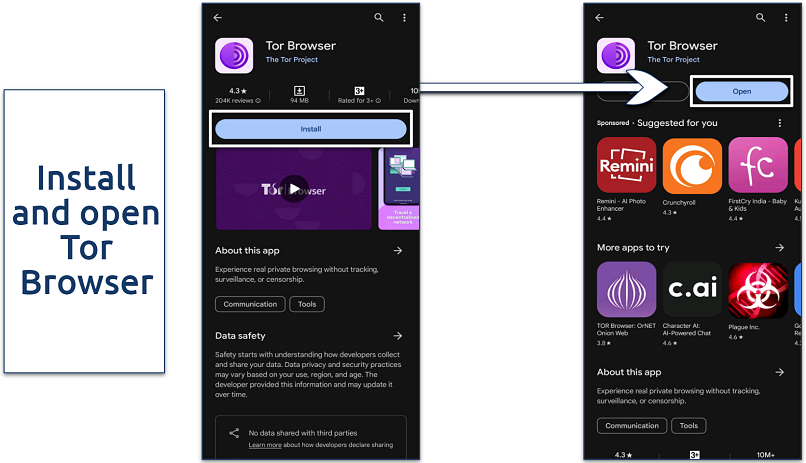 Make sure the app developer is the official Tor Project
Make sure the app developer is the official Tor Project
Step 2. Before starting Tor Browser, it's recommended to use a VPN for an added layer of security. A VPN encrypts your internet traffic and hides your IP address, providing an extra level of privacy.
Step 3. Open the Tor Browser and click the Connect button.
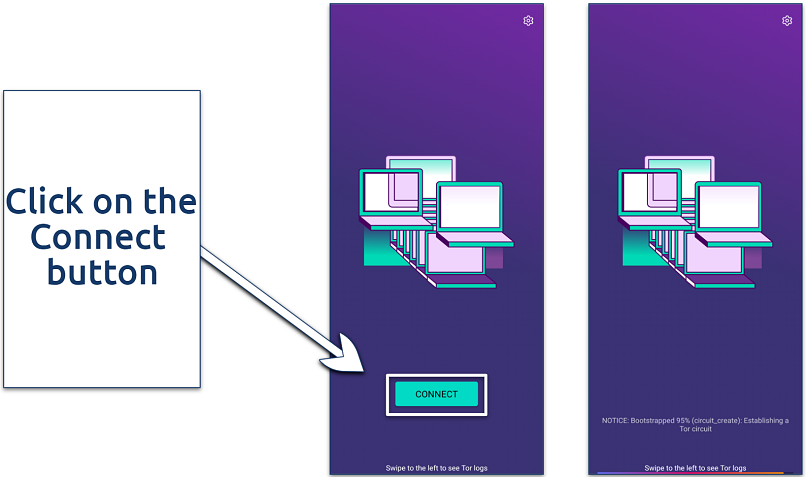 The connection time can vary depending on your device
The connection time can vary depending on your device
Step 4. Once connected, you should be redirected to the browser’s homepage. You can search and browse the Dark Web without issues. Check out some of the top legal Dark Web sites to get started.
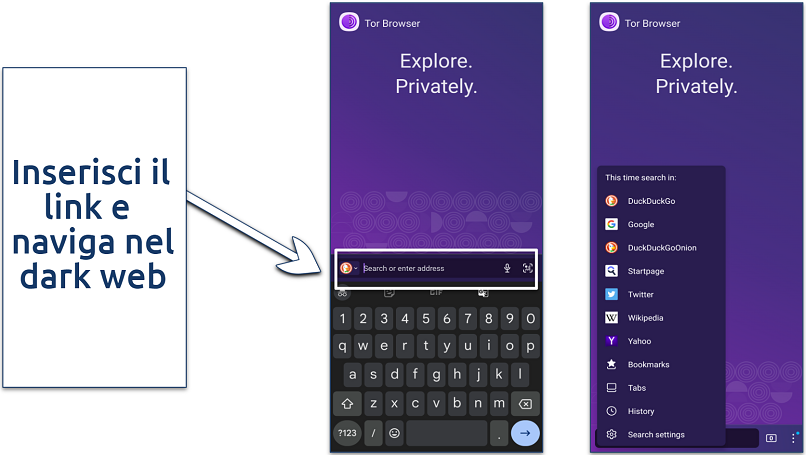 È anche possibile modificare il motore di ricerca in base alle proprie preferenze
È anche possibile modificare il motore di ricerca in base alle proprie preferenze
How to Access the Dark Web on an iPhone
Surfing the Dark Web on an iPhone takes a few extra steps compared to Android. The official Tor browser isn’t available for iOS, and you need to use two different apps to get into the Dark Web. I’m using the Onion Browser, which is from the Tor Project, along with Orbot to connect to the Tor network.
The Onion Browser provides a Tor-compatible web browsing experience, while Orbot serves as a bridge to the Tor network. This combination allows iPhone users to access the Dark Web securely and anonymously, compensating for the lack of a direct Tor Browser option on iOS. Let me guide you through how to access the Dark Web on your iPhone:
Step 1. Download the Onion Browser and the Orbot app from the Apple App Store.
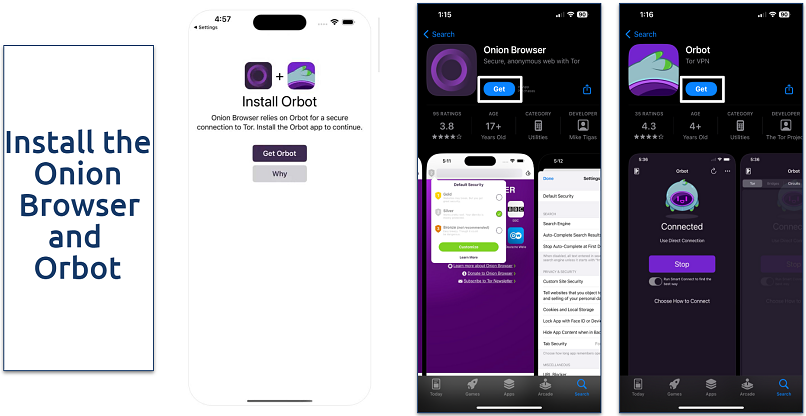 Avoid downloading any unverified Tor browser apps
Avoid downloading any unverified Tor browser apps
Step 2. Open the Orbot app and click the Start button to use a secure tunnel to connect to the Tor network.
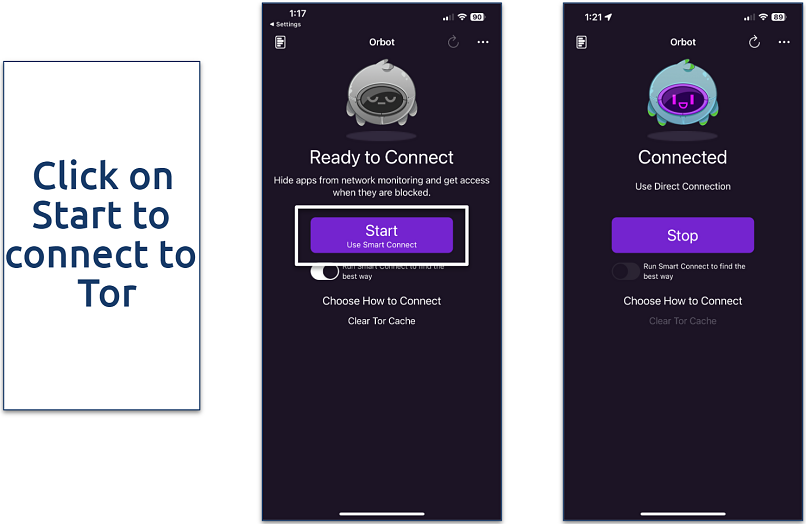 Your Wi-Fi connection may fluctuate during the process
Your Wi-Fi connection may fluctuate during the process
Step 3. To get started with exploring the Dark Web on your iPhone, simply open the Onion Browser app.
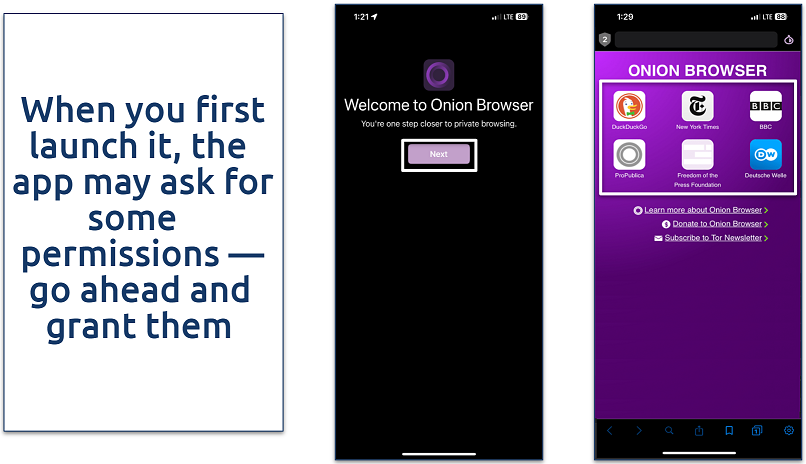 The homepage includes links to some popular Dark Web sites
The homepage includes links to some popular Dark Web sites
Tips on How to Access the Dark Web Safely
Many sites on the Dark Web engage in illegal activities, such as drug trafficking and financial fraud. Besides, you may stumble upon sites that could infect your device with malware, ransomware, or trojan viruses.
Remember, the Dark Web can be a bit riskier for mobile users. Hackers there might have tricks up their sleeves to track your location through GPS or WiFi, and they could potentially access other sensitive information on your device. To stay safe while exploring the Dark Web, here are some handy tips to follow.
1. Use a VPN
While Tor provides a high degree of anonymity by routing your internet traffic through multiple servers, thereby masking your IP address, it isn't infallible. Using a VPN in conjunction with Tor (commonly known as "Tor over VPN") adds an extra layer of encryption to your internet traffic and hides your use of Tor from your ISP. This can be beneficial if Tor usage is monitored or restricted by your ISP or in your country.
A VPN’s encryption is particularly key in protecting the connection between your device and the first Tor relay (entry node). This can prevent your data from being intercepted in this segment of the connection, which might be a concern in certain scenarios, such as using unsecured WiFi networks. Here’s a list of the safest VPNs for accessing the Dark Web.
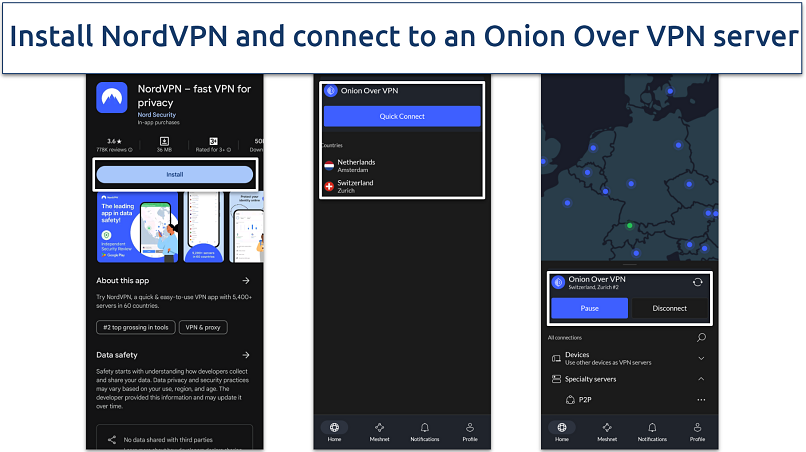 You have 2 Onion Over VPN servers to choose from — in the Netherlands and Switzerland
You have 2 Onion Over VPN servers to choose from — in the Netherlands and Switzerland
2. Reduce Tracking and Limit Data Collection
Tracking and data collection can affect you across both the dark and surface web. Completely avoiding it might not be feasible, but minimizing your data's chance of being gathered, shared, or exposed is crucial. Here are several strategies to help safeguard your privacy:
- Disable location services on your device when navigating the Dark Web.
- Decline any permission requests from Dark Web browsers, such as access to your contacts, settings, camera, or additional features.
- Use a device that isn’t linked to any sensitive banking, finance, social media, and messaging accounts — essentially, use a secondary device that’s entirely dedicated to Dark Web access.
- Disconnect your device from other smart devices in your home. If your phone and smart devices like watches, speakers, or home assistants are on the same network, a breach into one could jeopardize the privacy of the others.
3. Configure Your Browser Settings
The Tor Browser provides 3 levels of security — Basic, Safer, and Safest. The Basic level enables all features and scripts, making it the most susceptible to attacks, such as script injection. The Safer level enhances security by disabling certain features, and the Safest level entirely blocks scripts, which may impact some functionality.
Similarly, the Onion Browser also has 3 security levels — Gold, Silver, and Bronze. The Bronze level maintains the lowest security, allowing scripts and access to videos and your microphone by default. The Silver level restricts access to your microphone and other features but permits JavaScript, while the Gold level severely limits all access and scripts.
You can adjust the security settings by following these steps:
Step 1. Launch the Tor Browser app or the Onion Browser app on your device. Tap the three-dot or the gear icon and enter the Settings menu.
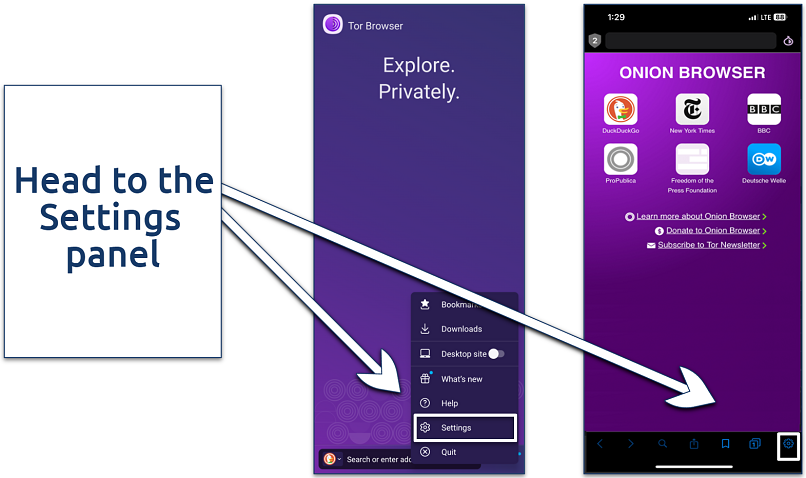 Click on the Settings button for Android and the gear icon for iOS
Click on the Settings button for Android and the gear icon for iOS
Step 2. Tap on Security Settings or Default Security, depending on your browser.
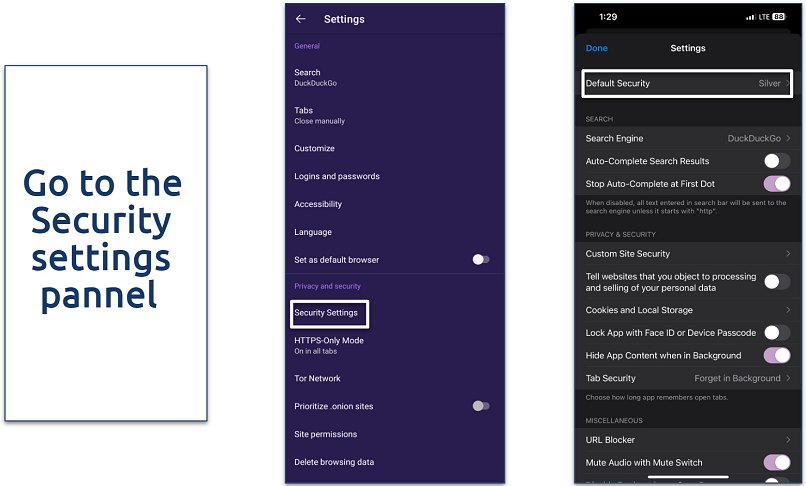 Click on the Security Settings button for Android and the Default Security button for iOS
Click on the Security Settings button for Android and the Default Security button for iOS
Step 3. Select your desired security level, with the Safest or Gold level being recommended for those new to the Dark Web.
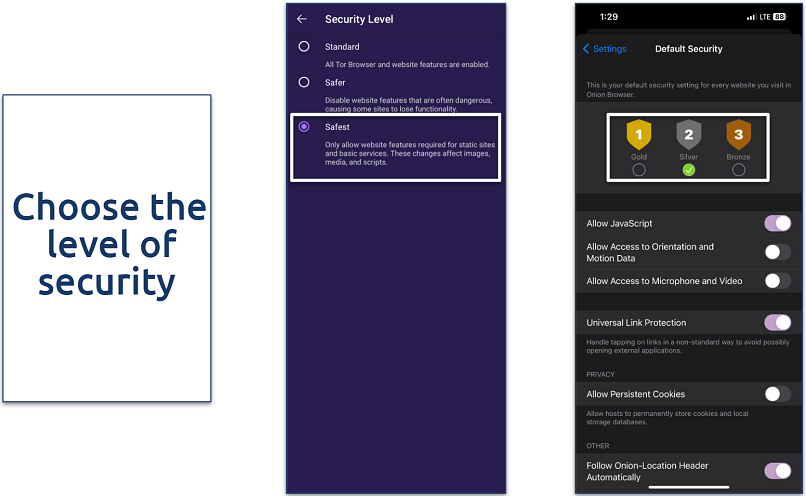 I recommend testing out the different security presets before making a final decision
I recommend testing out the different security presets before making a final decision
4. Check for IP Leaks
Even after you've set everything up, there's one more crucial step to ensure your personal information stays under wraps. Take a moment to check for any leaks — this includes your IP address and WebRTC. It's like making sure there are no cracks in your digital armor.
Getting ready to test is easy — just set up your VPN and use this WebRTC and IP leak test tool. It's pretty straightforward: follow the prompts on the screen, hang tight for a bit while the test runs, and then check out the results. What you're looking for is simple — no leaks. Your location should be nicely hidden.
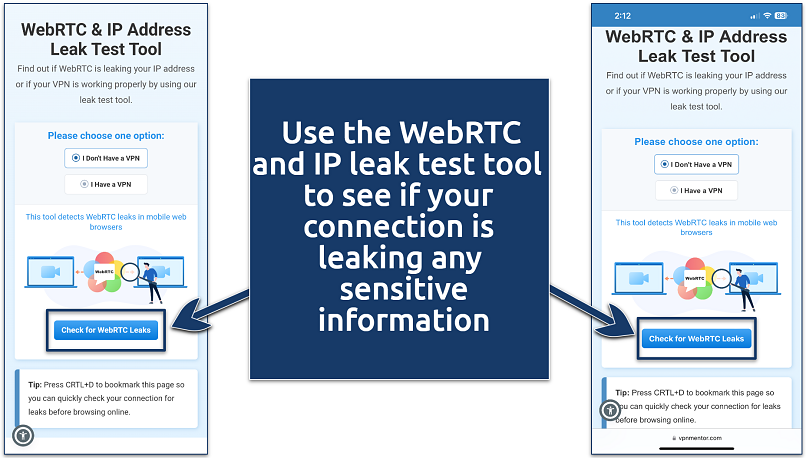 You can connect to a VPN server and test it out to see if you're protected
You can connect to a VPN server and test it out to see if you're protected
5. Never Reveal Any Personal Information
Considering the risks associated with the Dark Web, it goes without saying that revealing personal details such as your name, email, phone number, or financial information is not advised.
Use an alias when setting up accounts on Dark Web sites. Use disposable email accounts or look for a secure, anonymous email service. Also, make sure your webcam and microphone are disabled.
6. Install an Antivirus
The Dark Web is known for its anonymity and the presence of unregulated content, which can include malicious software and various cyber threats. An antivirus program helps protect your device from malware, ransomware, and other harmful software that you might encounter while browsing.
It can also provide real-time scanning, threat detection, and protection against malicious downloads or websites. Having robust antivirus protection adds an essential layer of security, helping to ensure your device and personal information remain safe while navigating the Dark Web.
Legal Dark Web Sites to Visit
Now that you’re ready to access the Dark Web securely on your phone, here are some sites that you can get started with:
| Website | Purpose | Link |
| The Hidden Wiki | An index of .onion sites, helping you navigate your way around the Dark Web | http://zqktlwiuavvvqqt4ybvgvi7tyo4hjl5xgfuvpdf6otjiycgwqbym2qad.onion/ |
| DuckDuckGo | A search engine that prioritizes user privacy by not tracking searches | https://duckduckgogg42xjoc72x3sjasowoarfbgcmvfimaftt6twagswzczad.onion/ |
| ProPublica | The Dark Web counterpart of the renowned non-profit investigative journalism outlet | https://www.propub3r6espa33w.onion/ |
| Tor Metrics | A site that gathers key statistics about the Dark Web | http://hctxrvjzfpvmzh2jllqhgvvkoepxb4kfzdjm6h7egcwlumggtktiftid.onion/ |
| SecureDrop | A platform for whistleblowers, which helps media outlets securely accept documents from anonymous sources | http://secrdrop5wyphb5x.onion/ |
FAQs on Accessing the Dark Web on a Phone
Is it legal to access the Dark Web?
Accessing the Dark Web itself is not illegal, but it can become unlawful depending on your activities and the content you access or download. The Dark Web hosts a variety of services, including both legal and illegal ones. So, you should be aware of your actions and adhere to local laws to avoid engaging in illegal activities. That said, accessing the Dark Web isn’t challenging and only requires a few apps to do so.
Is Tor free on iPhone?
Yes, Tor is available for free on iPhone through the Onion Browser (recommended by the Tor Project). This Dark Web browser allows you to connect to the Tor network on iOS devices, providing Tor's privacy features without any cost. You can easily set up Tor on your iPhone, but you do need to use Orbot for it to work.
Can I be traced, tracked, or hacked if I access the Dark Web?
Accessing the Dark Web does carry risks of being traced, tracked, or hacked, particularly if security measures are not adequately followed. While the Tor network provides a level of security, vulnerabilities can still expose you to cyber threats. To minimize these risks, it's crucial to follow best practices for security while accessing the Dark Web, including the use of VPNs.
Why isn’t the Dark Web stopped or shut down?
The Dark Web can’t be easily stopped or shut down due to its decentralized nature and the use of technologies like Tor. Apart from its association with illegal activities, it's designed to ensure privacy and freedom of expression, serving as a key tool for whistleblowers, journalists, and those under oppressive regimes.
Can my ISP see that I am accessing the Dark Web?
Yes, your ISP can see that you are using Tor, commonly associated with the Dark Web. Even though they can’t see what you’re doing on the Dark Web, you might be flagged for suspicious online activity. Using a VPN in conjunction with Tor can prevent your ISP from knowing that you're using Tor at all.
How can I find websites on the Dark Web?
Finding websites on the Dark Web typically involves using specific directories, such as The Hidden Wiki, or search engines like DuckDuckGo, Torch, and NotEvil. These resources can guide you to various legal .onion sites, ranging from forums and news outlets to more specialized services.
Can I access the Dark Web without Tor?
No, you can’t access the Dark Web without Tor as it provides the connection needed to access .onion websites. While there are other privacy-focused networks like I2P and Freenet, Tor remains the most widely used method for securely accessing the dark web. You can use the Tor or Onion browser to access the Dark Web on Android and iOS devices.
What is a Dark Web alert?
A Dark Web alert is a notification service that informs you if your personal information has been found on the Dark Web (for example, email addresses, passwords, or credit card numbers). This service helps you take timely action to secure your accounts and protect your identity. NordVPN has a built-in Dark Web alert called Dark Web Monitor.
How Is the Dark Web dangerous?
The Dark Web can be dangerous due to its association with illegal activities, such as the sale of drugs, weapons, and stolen data. It also poses risks of malware, scams, and exposure to disturbing content. However, it's not inherently malicious and is used legitimately for privacy and free speech, especially in oppressive regimes. Nonetheless, it's crucial to prioritize safety when exploring the Dark Web. Following our security tips can help ensure a safer experience.
Wrapping Up
Diving into the Dark Web on your phone is quite straightforward. Remember, the Dark Web isn't used solely for illegal activity – it's a hub for privacy and free speech too. Follow our safety tips, and you'll be navigating this hidden part of the internet smoothly and securely on your mobile device.



Please, comment on how to improve this article. Your feedback matters!